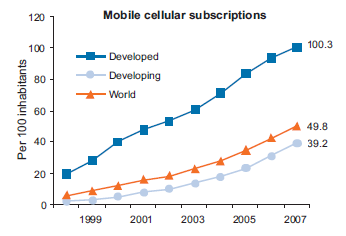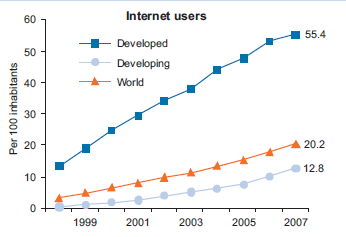The shrinking digital divide and other aid fairy tales
 I got pissed off today. Ok, I get easily pissed off, but that is what drives me, what keeps me going (a topic for another post, on another day)..
I got pissed off today. Ok, I get easily pissed off, but that is what drives me, what keeps me going (a topic for another post, on another day)..
At noon time, we were sitting in a presentation of a dude who introduces the main trends in the world and tries to explain how it influences our work.
The guy is external to our organisation, so his ignorance is forgiven.
Five seconds into the presentation, "BAF!", I get mad. The first line on the first slide of the presentation, and I get mad. It sets the tone for the rest of the two hours (OK, I walked out after an hour, but that is besides the point).
The first line on the first slide stated "the digital divide" (the indicator between the use and penetration of ICT -Information and Communication Technology- in developing versus developed countries) becomes smaller.
Unfortunately it was the first of many points where I did not agree with the speaker and thought the whole presentation was based on a series of outdated, hollow and superficial quotes from news articles without sourced facts, a clear analysis or any interpretation.
But hey, even the worst of presentations gives people the opportunity to think. And to discuss. So.... let's think and discuss....
Let's first really look at the digital divide and then broaden that dynamic. This is not the digital divide itself. It is more "why we all like to believe the digital divide is getting smaller". But mostly it is about honesty. About our daily professional lives. What can we learn out of this.
1. The Digital Divide: Bigger or smaller?
The ITU 2009 year report just came out. While in its summary they state the divide is 'status quo' or 'slightly improving', checking their own data, it is clear you have to look really far for any sign of improvement.
In gross numbers, yes, the subscribers of Internet, mobile phones has gone up in the developing world (and that is good), but not by far as quick and with as deep a penetration as in the first world.

In 1998 the "digital divide" in mobile phones was (20%-0%=) 20%. In 2007 (the most recent data), it is (100.3%-39.2%=) 61.1%. Now prove to me the digital divide is getting smaller, hein? Hein? Hein? ;-)
How about Internet penetration?

There the digital divide went up from 13% to 42.6% in 8 years.
2. Now for a core issue:
Sure enough, we all have seen the really interesting pictures of the farmers in the bush getting SMSes with market prices etc.. We read articles about it. Hey I wrote and published some of them myself... BUT how much of that has a real and true impact?
Still a positive balance? OK, so how how much of that is really having a positive impact on the global scale.
Still a positive balance? I doubt it, but then hold whatever is left against the massive increase of hunger and poverty in the world. The progress on the farmer SMSing his crop data disappears in the void if you compare to all the rest of the bad news.
Where did I read again that Ban-ki Moon stated we are further away from the MDGs than five years ago?
Here is what I really have on my mind. What really makes me mad.
The worse thing that can happen in the humanitarian world (according to me) is the 'make believe'. It is such a the self-justification and self-preservation pitfall it is not funny anymore.
We, all humanitarians alike, like to believe we make a difference, and that the world is becoming a better place tralala. While we *have* an impact, and do save lives, and do make progress, but... the progress is not half as much as we think it is, or like them to be, or make them believe to be. It is not half as much as what we, humanitarians, could do.
I challenge anyone to prove me wrong.
The ITU report is the living proof of that. Read carefully what they state in their introduction. And HOW they say it:
Based on the IDI values, statistical methods were applied to measure the changes in ICT developments by groups of countries at different ICT levels, from 2002 to 2007. Although results have to be interpreted with caution, they suggest that globally the digital divide is as prevalent as before, but is slightly closing between countries with very high and low ICT levels.
I have to "interpret it with caution" and even then "it is as prevalent as before or slightly closing". To me this is as much as "the figure show clearly the digital divide is getting bigger but we don't dare to tell you as doing so, will show we suck at our job".
That is ITU.. And how far have we indulged into this make believe within the aid world? Within each of our own organisations? In our daily lives? How many times have we not given numbers a positive spin? Or not shown the negative numbers? Or given the negative numbers a positive explanation?
I can somewhere understand, but not justify, why this is done towards the outside world. But least internally, within the aid world, within our own organisations, and between me-and-myself, we should be honest. And we hardly are.
The reality of aid work, accepting the hard facts that things are not rosy are hard to accept. The negative spin of poverty, the fact we hardly see any impact anymore on poverty (and the 'we' stands for the humanitarian world as a whole), touches the core of our 'raison d'etre'.
If we -aidworkers- believe we suck at what we do, we will lose motivation. If we tell donors we suck at what we do, we will lose funding. And suck even more.
But, hey, there is a balance between "loosing motivation" and "loosing sight of reality". And this is where we are today. We have been fooling others and ourselves for so long, we started to believe our own fairy tales.
If anything, this is a plea for more openness, for more frank discussions. For taking down the silos. And for having the guts standing up in those useless meetings where everyone is looking at each other, knowing everyone is bullshitting, and start shouting:
and I am not going to take this anymore."
A quote from the movie "Network" (which has marked many moments in my life). Watch this:
Even if you are not an aidworker, do you see this applicable to your life? How many times have you stood up and yelled "I am as mad as hell and I am not going to take this anymore" or are you complacent with the bullshit?
So, "Are they yelling in Atlanta yet?" Hahahaha.
Read the related post: Aid is Dead. Long Live Aid!
 Peter. Flemish, European, aid worker, expeditioner, sailor, traveller, husband, father, friend, nutcase. Not necessarily in that order.
Peter. Flemish, European, aid worker, expeditioner, sailor, traveller, husband, father, friend, nutcase. Not necessarily in that order.
8 comments:
Great post! Your charts really put it into perspective.
I understand your frustration. Not taking the whole picture into account is not only a waste of time, it is counterproductive.
No resting on one's laurels in the humanitarian business! :) Too much work left to be done.
Grace
(shiningeyes)
P.S. Network is a great movie.
Well, you can look at the absolute percentage values, and if you do so, your interpretation seems right.
Another interpretation could be a 20:1 ratio in mobile phones in 1998 vs. a 2.5:1 ratio in 2007. This would be one possible interpretation in which the gap is closing.
Homework for you: Show why you chose the absolute values and think they are the right way to interpret the data :)
baf!
I keep having both positive and negative thoughts about an issue like the digital divide and dont want to make quick judgments if the gap is growing or not as I dont trust any statistics. Statistics are done for a purpose by someone to proove a point one way or another. Not necessarily objectively.
Since I live in Uganda I see a bit there each time I go on break.
There are 3 mobile networks covering almost the entire surface of the country this happend already 7-8 years ago. In the bigger cities they even have the 3G networks. Just about everyone seems to have a mobile phone. It seems to be one of the first things people do buy if they ever can scramble up to 5 dollars and buy a ”third” hand repaired phone. I can also get a 7.2MBps dongle and get wireless connectivity for a 120 USD a month with unlimited download. Thus 2 times the cost in Rome.(In Rome I have 100 hours access time on one load thus reload half way through the month.)
My wifes grandma lives in the village 70 km from the capital. She is 81 years old, has no running water, no electricity, no social security. She lives in a small 3 x 4 meter very basic house and takes care of 10 cows, 10 goats ,5 pigs and about small 6 -7 children from the family. I have never seen a happier and more hardworking woman in my life.
And! She has a mobile phone. If she can manage to put 2 USD as credit a month that would be it. Thus she would do like anyone else in Uganda, beeping me assuming i'll call back as I must have credit?! She has to run to the village chief to get it charged though as he is the only one with electricity.
She would not really be a good target for digital advances but there are young people around her that would but at what priority living in the same circumstances as her.
The question I keep having is would people in that situation be happier, get more opportunities and enjoy life better because they would have the same access as me to Internet, satellite TV.
Or is this our superficial interpretation of what makes one happy and get more opportunities?!
So is the digital divide growing and growing as alarming as it seems? or is it the basic circumstances around that does not improve and thus making it be perceived as growing at an alarming rate?
To have internet connecitivity people need first to have in ”backwards”order
Connectivity minimum ADSL the way the internet is going these days.
Computer but not any useless old one as then the heavy load of media would not work
Electricity
Money to spare
Somewhere to live
Food on the table
......
Its a year ago I actually for the first time got a 7.2mbps dongle for Internet and that was here in Rome. It has existed here for something like 3-5 years ,gotten a bit faster and cheaper over the years.
But for the first time when heading to Uganda I could also have that and believe me the quality was exactly the same as in Rome. Well good speed when connected but with numerous breaks in the connectivity. (Just as in Rome)
Now take that back to the situation above. Even if Internet accesss was given free ,even if the modem was given free, even if the computer was given free that would still not give people access to Internet. Simply because the basic pre-requisits for life would not be there to the right level.
The people in the village still do not have running water, electricity and for sure no spare money. If they did for sure they would probably not first think of Internet even if it was available. It would go to pay the waterbill and electricity bill?!
However looking at the connectivity it is there. In the neighbourhood I live in Rome I have seen one Internet cafe. In Kampala I have counted to 20 Internetcafe's in my neighbourhood. What conclusions should be drawn from that? In Statistics they often count users per inhabitants what is that based on .. Subscribed users to a company? Well then they would miss probably 90% of all the users in a country like Uganda when it comes to Internet. The same on the phone lines/mobiles. In Uganda almost every single small shop has a Base-mobile phone people can use at a cost. We used to have a lot of phone booths but I think by now almost all are gone (or vandalized to infinity)
Ofcourse it would be great if they all had the same access at home as I do but I believe it has less to do with the technical advances in the country on the connectivity compared to the other factors that surrounds life.
My perception though is that the last few years the gap has narrowed if the surrounding life effects are removed from the equation. However I am also convinced that since the economy crash last year the first ones that will see the short end of the stick is in the developping world and that scenario on both the digital divide as well as all other aspects of life.
http://www.youtube.com/watch?v=g6srOAqpqj0
Monday daily song :-)
Peter
I bet that (external) presenter has NOT actually live in the field or an under-developped country to realize that all his "talking points" don't make sense.
Well HQ said that you need to get trained , so be it even if it is not actual facts ( I have to laugh when I am told that the decision makers in HQ wherever they are don't even know how use their computers to read their e-mails let alone draft a memo though they know how to use their mobile to pest their subordinates ).
As someone who witnessed the whole Internet and supposedly high B/W demand of the late 90's ( I was 100% in it because I was butting heads with my mgmt about unrealistic data) before the bubble went bust in 2001, I have to laugh when I see such data. We used to call them vapourware
Anyway take care and make sure you eat before getting those fancy electronic gadgets that you won't be able to use on the road :-) (wink)
@The Beaver:
-I have my doubts too that the guy has ever working 'in the field'...
anyway, it stirred up a good debat ;-)
@Mats:
-excellent comment!
@Grace:
-Thanks Grace: will not rest on my laurels, that is for sure!
@Anonymous:
-Thought the delta in %-ages was the right way to show 'divide'!
P.
Fully fully agree with that post. I commented time ago just in the same terms (http://ictlogy.net/?p=402) and it is sad to see that things not only have not improved, but have indeed worsened: If you take into account broadband, the digital gap is way bigger and increasing, both in land and mobile lands.
Post a Comment